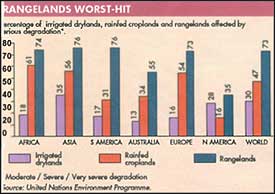The community factor
The community factor

NON-GOVERNMENTAL organisations (NGOs) maintain that to halt desertification it is necessary that nations make consumers pay the ecological costs of such products as tea, coffee, mango, timber and meat.
Another essential requirement, according to NGOs, is the strengthening, politically and financially, of local communities so they can manage their land in accordance with the varying ecological and cultural factors. Out of the 173 NGOs accredited with the Intergovernmental Negotiating Committee for the convention to combat Desertification (INC-D), about 50, most of whom were from Africa, attended the Nairobi meeting. They listed rapid trade globalisation as a factor exacerbating underpriced exports of timber, meat and agricultural crops, which further affects the land.
In a joint statement, the NGOs called on INC-D to take up the causes -- and not just the symptoms -- of land degradation. Several of them were critical of governments that sought to limit the convention to an exercise in tree-planting. "Any desertification convention must be directed against the largely economic factors that lie at the heart of the causes of land degradation," said Winston Nsekhe of the Southern African Commission for Conservation of Soil.
NGOs also criticised aid-project mechanisms and warned the convention should not reinforce it by putting out yet more technocratic solutions to arrest land degradation. ECAF, a Nairobi-based NGO, stated that despite 529 projects being undertaken between 1978 and 1990 to combat desertification globally, a UNEP survey showed a significant worsening of the environment, including falling groundwater levels, rangeland degradation and deforestation.
A question raised at Nairobi was why land degradation occurs when history is replete with examples of valuable community skills that help conserve soil, harvest rainwater and plant crops in a sustainable fashion. M S Sathe of the Pune-based Development Group explains that these skills were earlier ignored, but they are now being reassessed. Mismanagement of land invariably occurs when local communities lose control over the use of their land. South Asian NGOs pointed out in their joint statement that "this not only led to the removal of their stake in conservation of local land, but also gave decision-making power to macro-institutions, far removed from local reality and problems."
The New Delhi-based Centre for Science and Environment emphasised in a statement that supranational governance, as proposed in the forest convention, will result in global bureaucracies setting international guidelines for what are "globally perceived" rules for sustainable development. In such a situation, community-level enterprise and experimentation will get suppressed.







